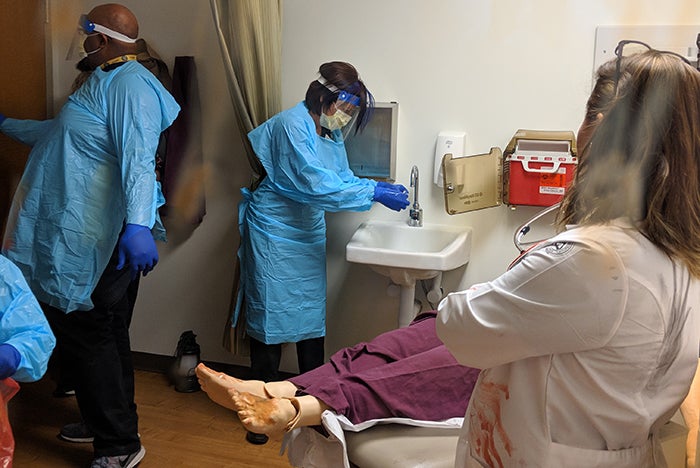VA system creates infection control training ground

Voluntary participation in infection prevention training jumped when Central Texas Veterans Health Care System introduced its escape room theme.
Central Texas Veterans Health Care System
Back in 2017, when Gracia Boseman, R.N., and Kristy Causey, R.N., launched an infection prevention training program at the Central Texas Veterans Health Care System, they had no idea how relevant their program would be just three years later when the COVID-19 pandemic hit.
The two were looking for new ways to boost voluntary staff attendance to the infection prevention and control education classes, and borrowed from the popular escape room game concept, where participants work as a group to gather clues and solve puzzles to complete the game.
They designed a zombie-themed, high-consequence infectious disease escape room. It was centered around a “what-if” pandemic, novel flu scenario where participants had to select and don the appropriate personal protective equipment (PPE) before entering the room. Once inside, participants had to work as a team to find all the clues in a specified amount of time.
“The more senses we engage, the more people learn and the higher the level of retention, so we designed a hands-on, immersive training environment,” Causey says. “We set up different types of specimen collection kits, including viral transport medium and bacterial swabs, and participants had to pick the correct swab. We also placed whitening laundry detergent on surfaces to show where germs were and how they transfer from one surface to the other.”
The concept was a hit, and Boseman and Causey achieved their goal of increasing voluntary participation, especially among nonclincal staff.
Class averages jumped from 20 clinical attendees to 189 clinical and nonclinical attendees, including clerks, facilities and engineering staff, and environmental services staff.
“The escape room was successful beyond our wildest expectations,” says Boseman, who added that self-reported behavioral changes among participants include an increase in handwashing by 61% and PPE use by 21%.
“Staff also became acutely aware that contaminated surfaces play a role in disease transmission, as they carry viruses and bacteria, and the importance of wearing PPE — knowledge that would prove invaluable during the COVID-19 pandemic,” she says.
Although planned trainings for 2020 were canceled due to COVID-19, Boseman and Causey say that the more than 1,100 health care staff who attended the classes were more actively engaged in preparation for the pandemic.
The program has also expanded. The Central Texas Veterans Healthcare System has provided consultative input to a half-dozen other Veterans Affairs health care systems interested in replicating the escape room as part of their infection prevention training and other simulation training.

